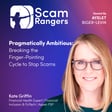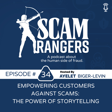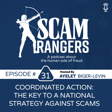Identifying Stories Indicating Scams
00:00:00
Speaker
The story is the proof of the scam and we have to softly change the acceptance of what is the scam because bank accounts do not freeze. Not everybody is a widow. Not everybody, if you're divorced, your wife has slept with your best friend. So there are certain categories that we can put people in.
00:00:28
Speaker
And we can say categorically, if this is what they have said to you, it is a scam.
Introducing Ruth Grover, the Scam Ranger
00:00:56
Speaker
Welcome to Scam Rangers. Today's Scam Ranger is someone who really helps victims closely, in particular, victims of romance scams. And not only does she help victims, she also does whatever she can in her powers to help prevent scams. Ruth Grover joined the Royal Navy in the UK after school. Then she was a police dispatcher where she met her husband, Jeff, who was a police officer for 30 years.
00:01:25
Speaker
When Jeff passed away and she was widowed, some things happened to her and she'll share them with us today. I'm really, really inspired by Ruth and her colleagues who work at Scam Haters United to help people.
Ruth's Personal Scam Encounter
00:01:40
Speaker
Welcome to the podcast, Ruth. It's so great to have you here. Thank you, thank you very much. So tell me a little bit about Scam Haters United, how you started it, what happened to you, you have a personal story there.
00:01:52
Speaker
Yes, it did happen all quite slowly in 2008 was when my husband passed away after he'd retired. I put widowed on my Facebook page because it asked for status and not very long after that I was contacted by a four-star general in the US military which I'm in England so that was quite unusual and he wasn't the only one.
00:02:20
Speaker
I very much have a background where proof is needed. You call me into police control and I'm going to ask you questions.
Birth of Scam Haters United
00:02:28
Speaker
So I started to Google. And I was really shocked at what I found because it wasn't what I was expecting. The realization that criminals were out there actively hunting for vulnerable people was something I just couldn't turn my back on.
00:02:48
Speaker
So eventually, after a lot of research, I decided to do it myself. And our first Facebook page was born. By the time I started that page, I hate scams. They are so destructive, they manipulate, they ruin. A scam is a terrible act of cruelty on any human. I was watching TV that night that I started the page and there was a football match, but suck again.
00:03:19
Speaker
I was watching Manchester United. I felt it was right. United, we needed to be a team. Work as a team, think as a team, and act as a team. United means together. We must work together with this. So it wasn't a throwaway name.
Victim Support and Scam Verification
00:03:36
Speaker
It was something that I felt inspired me. As part of our volunteer group, we've got women from the UK, across the USA, and Iranian, Canadian, Germans,
00:03:48
Speaker
Romania, Latvia, we're here for everybody. Where we don't speak their language, we use Google Translate, but we never turn anybody away. It may not be perfect, but we can communicate.
00:04:02
Speaker
That's amazing. And I really like how you were watching a game by a soccer team and taking that Manchester United happened to be the name, but that whole concept of a team. And I really agree that the only way to address this problem is to work as a team, work together, collaborate. And I think all of my guests, when I asked them what they're hopeful about, they talk about the collaboration and the industry and really seeing cross-functional
00:04:33
Speaker
stakeholders coming together to solve this problem. So how do you help victims? You mentioned a page and we'll definitely put all the resources that you provide, which are many in the show notes.
Impact of Scams on Victims
00:04:48
Speaker
But tell me a little bit about how you help victims and if you can share a few examples of stories and how your team has helped victims.
00:04:58
Speaker
There are a few ways that we can help victims because we get the victims themselves and we get families. We get a family who comes to us saying a close family member is in an online relationship. You know, the father's died, the mother-in-law's got herself a new man. We can research the pictures used.
00:05:17
Speaker
speak about the stories given and verify the scam, which is important. We need to give as much information as we can to verify it is a scam so that we can move forward. Scammers invest a lot of time and emotion on the victim. So trying to get a victim out of a scam, we're bursting bubbles and it's not an easy thing to do.
00:05:49
Speaker
Let me think about a woman on a dating site. She was in her late 30s. She met a professional looking man with a son. It quickly blossomed into romance and of course a future was promised. He had a small son and the woman was not able to have children. Now being a mother to this little boy was a very big part of this scam and a very cruel part as well.
00:06:18
Speaker
He was away, working away as they are and for some reason his bank account was frozen. So she started sending money as he was overseas on business but they were coming home to her to live as a family and basically happy ever after. Long story short, she sent lots of cash.
00:06:40
Speaker
took money in as his bank account was frozen and people wanted to send him money. So she took it in for him, converted it to other means of payment and sent it on to somewhere else.
00:06:56
Speaker
there was bitcoin there was iphones there was you know again with this little boy um stories around the little boy i mean she even went to a fair and saw some minions and this little boy loved minions so she went on the stall and she won him a minion that was how much she was invested in this after a year
00:07:21
Speaker
and a hundred thousand dollars. Deeply in debt with very little, but he was coming home to her. By this time she was mixed feelings, but if he came home to her, she was going to get the money back from him. She went to the airport and
Understanding Scam Tactics and Victim Support
00:07:37
Speaker
stood there with the welcome sign and the gift for the little boy. Well, you can guess what happened. She called him when, when she got home.
00:07:47
Speaker
And she was so depressed and so desperate by the time she got home, she had a pile of pills in front of her. And she said to her scammer, I have nothing left. All I can do now is take these pills and die. Her scammers reply was, well, you've got to do what you've got to do. That's heartbreaking. I'm quite thankful for that cold hearted response because then she talked to a friend and
00:08:16
Speaker
That lady's a good friend to me now. Another one, because we do have a lot of very, very sad stories, people do not realise the ultimate toll that something like a romance scam can take. A mother-in-law was talking to a man on an order rig. She had a friend. He was coming to see her a few times and of course he never came. She asked her friend to talk to his friend.
00:08:46
Speaker
He was getting on so well with this lady, he would like his friend to have the same love. So they agreed and they talked to these two men for quite a long time. They used to meet up and plan their lives together because these two men were planning on buying big houses near each other so they could all live as friends and close together. The one thing they never shared was how much money they were sending. Never mentioned that to each other.
00:09:16
Speaker
Again, long story short, because these stories are long. The first woman came to her friend really, really upset. She was homeless. She'd sent everything she had to this man. She'd lost her home and she had literally nowhere to sleep the night. So she went to see her friend.
00:09:41
Speaker
They talked about it a lot and the friend talked to us about it a lot. And a few weeks later, the lady came back to me over something else. I think she'd been quite bothered by other scammers trying to contact her. And I said to her, how's your friend? How's she doing? She picked herself up. Oh, no, she said. There was nothing. She couldn't take it anymore. So she took her own life on me the first.
00:10:09
Speaker
It really affected me because it was not what I expected. And I just went cold. Were they talking to the same man, you think?
00:10:21
Speaker
They were talking to the same room full of men because the scam is not one-to-one, it is a team. And the team work in a room.
Evolving Scam Demographics and Platforms
00:10:31
Speaker
So they are different characters in the scam, some of the kids, some of the mothers. I've got one at the moment talking to an ex-wife. But, you know, they are different characters in the scam. And it makes the scam go more
00:10:51
Speaker
It sounds better if there are a lot of characters in the scam as you would have in a life. So it carries it along. And of course you've got a room full of people there all wanting the same thing, as much money as they can get from the people they are talking to. So how do you help victims? You mentioned Google search and reverse image searching as well. In what other ways does Scam Haters United help victims?
00:11:20
Speaker
The good thing, if there is a good thing about scams, is the fact that scammers buy formats, which scripts? So you find that although they might be on an iRig, they might be in Syria, they might be a general. You find that the basic story that they've said is very much the same. So we can say to somebody,
00:11:50
Speaker
um you know oh he said he's widowed well yes yes he is oh his wife died of car crash cancer or childbirth now nine times out of ten it is one of those three so it gives us a little it gives us a little bit in because we can anticipate what they're going to say if they're divorced they caught them sleeping with their best friend and they couldn't stay with them so they had to part so we can flesh out
00:12:21
Speaker
without being told what they've said. The story is the proof of the scam. Most people like to know who the person is in the picture. Most times you can find out. But if you can't, it's the story of the scam that tells you what it is.
00:12:42
Speaker
So to clarify, when you talk to these victims, they don't want to let always to let go. They might reach you actually when they're in that phase of despair when they already lost a lot of money. And then you help them maybe get out of the scam by understanding that this is a well known story that there's a real person.
00:13:04
Speaker
who's gone through identity theft, whose pictures are used and that's a way you actually help the victims and then you provide support as a community to show it's not just them, it happens to many people and they shouldn't feel shame and they, you know, that level of support. I can honestly say of the thousands of victims I've spoken to over the years,
00:13:28
Speaker
I think 100% at some point, usually at
Emotional Toll on Impersonated Individuals
00:13:32
Speaker
the beginning of us talking about it, the victim will say, oh, and by the way, I don't mind the word victim because a victim means somebody's done something bad to you. You haven't done it to yourself. Somebody's come and done something bad to you. We hope to turn them from victims to survivors. They will say to us, I feel so stupid. How can I have been so stupid?
00:13:59
Speaker
Not true, for a start, they trusted. They wouldn't do this to anybody else, so why would anybody do it to them? They trusted. That was their worst thing. And you can't blame somebody for being nice. So we've got to turn that around. Hating themselves is not going to do anything for anybody, and it's not going to help them move forward. We do have a very good group.
00:14:28
Speaker
that is just victims. You know, it's not official counsellors, it's not, but people can go here and they will go in the group and they can say things that they couldn't say in their life. Like, I know this sounds really silly, but I miss him. Or I can't believe, you know, I didn't look into this. Now there's always somebody else there who will say, yeah, I was like that.
00:14:56
Speaker
That was the same for me. And that helps because then they are not the only person in the world who's actually gone through this and who's actually fallen for it. So that seems to help a lot. How many, roughly, if you can provide a number of victims that you helped? I don't know. I would think we take on board maybe
00:15:23
Speaker
200. We have a lot of people who come back to us a lot. So we have a lot of repeat people. The current Facebook page, which isn't our first, it's our third, but this one's stable, the other two we lost. We've got 67,000 followers on that page. We've got 28 something on
00:15:48
Speaker
Instagram. We've got 35,000 followers on YouTube. We've got, you know, the ScamheadsUnited.com has got 7 million hits on it since 2016. And over that time, it has built up, you know, we are very busy, but we must get, I bet we get 100 unique victims a week.
00:16:14
Speaker
possibly more because we're answering on Facebook. We're answering on Instagram. They're sending us emails. They're answering on the Google blog page. So it's really difficult to quantify, but there's a lot.
Deepfakes and Story-Based Scam Identification
00:16:33
Speaker
And what would you say is there any typical
00:16:37
Speaker
class I would say of people that demographically that reach out age, gender, origin that reach out to and seek help. When I first started it would have been over 50s widows of any social standing because when going back then
00:17:00
Speaker
They very much chose their victims from Facebook, like they did with me. I had a profile picture so they could see who I was. I had widowed in my bio so they could see what I was. Then they moved to, or they expanded to Instagram very much. I mean, we've always had them on dating sites, but not as many as now dating sites are flooded.
00:17:27
Speaker
But when they first started to move to Instagram, it changed the demographic a lot because they weren't always obvious who they were picking. So they would create a profile and some silly words and what I call, and excuse this, spray and pray. They would just send out hundreds
00:17:47
Speaker
requests and see who they got. So you might get lots of grannies, you might get lots of older women, you also get lots of 30-something mothers, you also get lots of somebody who might be a lawyer, who might be a teacher. There isn't, these days, there isn't a demographic that you could say they hit on. It is right across
00:18:17
Speaker
the spectrum of everybody. We've had them. I think the youngest we've had for romance scams are sort of in the 30s. And because people go on dating sites, we get younger people coming from there. TikTok has a younger audience again. And TikTok is just flooded. I'm not quite sure if there's any real people on there.
00:18:46
Speaker
you know, where they will make one account on one platform, they'll make 100 on TikTok and just send them out. And we go back to our room full of scammers. So we've got a team in the room. That team works 24 hours a day. They are working shifts because they are scamming right across the world. So they've got to be there for every time zone.
00:19:12
Speaker
So they literally have a shift pattern. So they get everybody. And we talk a lot about how they're well orchestrated, organized crime. It's not sporadic. It's really a team working shifts and very, very organized with their stories and their patterns and everything.
00:19:29
Speaker
You publish a lot of information about stolen photos that are used to impersonate military men and workers on an oil rig and just poses people who are away. And as you shared with your story, they're coming soon back to live with their loved ones that they developed a relationship online with. And we know that many of these photos are actually identity theft. They're stolen photos of people online and that's how you can detect with a reverse Google image or any image search.
00:19:59
Speaker
But what is the impact on the real men whose photos are stolen? Completely changed and blighted. You've got to remember that these people do not have a choice. You have somebody in the background who is going through, and Instagram's been a gift, going through social media, just picking out and making photo albums of whoever they think is good looking enough.
00:20:29
Speaker
they don't have any choices at all now you know when certainly when places like instagram and i suppose facebook came along people put their lives on there they loved going on holiday and putting their pictures on there not thinking somebody was going to come along and steal them
00:20:48
Speaker
Now, I've seen pictures that I saw at the beginning, you know, I've seen pictures for 15 years, the same ones used because they were stolen, you know, way back then. They can't stop their own and worse their children's pictures being used. Social media came in, everybody shared everything and nobody really thought of anyone lurking in the shadows to just steal them. Sadly,
00:21:18
Speaker
Once a victim knows they've been through a scam, many decide to search and find the person in the pictures. Now, I will say at this point that a lot of them search and they find everything about the man. I wish they'd done that at the beginning. If they put this much search into right at the beginning, the world would change because the scam couldn't happen.
00:21:49
Speaker
Many that we talk to get hundreds of messages a week. I mean, some of the worst-used get hundreds of messages a day. Many think they are the real ones that scam them. They get accused a lot. Some ask for their money back. You know, some say, well, I think you should pay. I've paid $30,000. I think you should pay me back.
00:22:17
Speaker
Some think they're going to get married to them. One businessman we know in California, he is an art gallery owner and so his business is quite open, quite public. He's very easy to find. He picked up the phone one day and a man started saying to him, stay away from my wife and send the money back. So he started to explain what had happened, his little story,
00:22:46
Speaker
He already knew that he's a typical victim of identity theft, right? Yes. Yeah. Very much so. So he did, he started to explain, but the man was having none of it. The man said, I know where you are. If you don't stop, I'll come there and put a bullet in you. Now they were just words. Wow. So he threatened him. Yeah. If you're on the receiving end of those words, you can't just take them as, well, I wonder if he will.
00:23:14
Speaker
And that changes everything. It goes from being a nuisance to something very dark, you know, in your life. We've got a couple of Marines, one in particular, who left and went into real estate, went out one day to do his normal calls that he did around his houses, got back to the office and there was a woman sat there waiting for him, thinking she was engaged to him. And again, had been sending money
00:23:44
Speaker
and thought he'd be very pleased to see her because she'd found out where he was. We've got lots of these. A man who's a sea captain who lives with his husband in Denmark. A lady from Germany came
Challenges in Removing Fake Accounts
00:24:01
Speaker
and knocked on the door because she'd been in a scam with him and somehow found his home address and went to see him.
00:24:13
Speaker
I mean, luckily, these men are really kind and they're really nice, but they get very, very upset about these. Yeah, I can just imagine. The one that really sort of bothered me a lot was a guy that we talked to was in the Air Force, and he was traveling home one night and he got a phone call.
00:24:37
Speaker
and it was his flight command. And they said, are you okay? Yes, I've just been to football practice. They said, oh, can you come in and talk to us as soon as you get back? So he did. And they'd had a call from a woman to say that he was suicidal and she was very worried about him. She wanted to break off the relationship with him, but he'd said over and over that he was going to kill himself.
00:25:06
Speaker
So she found out where the flight was based and she contacted his superiors and said, look, please can you check on him because he's suicidal. Now he didn't know what to say. So he explained, most of them have to explain this a lot in their jobs. So obviously he wasn't suicidal. It was the scammer who was trying to continue to talk to the victim and to convince her to send more money.
00:25:35
Speaker
I'm wondering what's going to happen now with the evolution of AI, which has been impacting scams a lot. So first I wanted to talk about deep fakes, right? So in the past, we would say to victims who are in the midst of Roman scam, try to get, or as a best practice, try to get a video call. If they don't agree to a video call, it's a scam.
00:25:57
Speaker
but now they can do video calls too. So they stole these images. How do they create video calls? At the moment, most of the scammers are still doing them quite basically. The ones that we see, they have some software that they can speak and move their face. The scammer can speak and move his face. This reflects on the person they're pretending to be. So the words come out of the mouth and the mouth moves correct.
00:26:27
Speaker
The eyes move and the face can move, but you still have the African voice. So that's, I would call deepfake 1.0. And so in that case that you just explained where the voice or the accent doesn't make sense to the origin.
00:26:46
Speaker
you have the native English speakers potentially will identify that and the non-native English speakers probably will not. Yes, because you've got people who only speak Spanish, only speak Thai, and they can't recognize. But seeing him move has not got to be enough.
00:27:11
Speaker
And many people say, I know it was him. I saw him move. That is not enough. So they have to go beyond that. The AI is going to be a problem. We have Deepfake 2.0, where you can actually do a voice clone and the video. So basically, and I've seen a
00:27:33
Speaker
a movie that was published two years ago by Denzel Washington, where the whole thing was synthetic. The AI was fed with photos of him or maybe video clips of him. And then the whole video was fake. That's going to be very, very tricky to be able to give signals to the victim. So video today is not even proof at all. So what is proof? No. I have been told, and I haven't tried it,
00:28:02
Speaker
that if it's a deep fake where they're using the face and the voice, they can't turn the head. For the deep fake, the head has got to be looking forward. Excuse me, if that's not right, that's what I've been told. Even if it's, by the way, even if it's right today, tomorrow, it's not going to be right. Exactly. Exactly. So I want to go back to something I said a while ago.
00:28:32
Speaker
that the story is the proof of the scam and we have to softly change the acceptance of what is the scam because bank accounts do not freeze. Not everybody is a widow. Not everybody, if you're divorced, your wife has slept with your best friend. So there are certain categories that we can put people in
00:29:02
Speaker
And we can say categorically, if this is what they have said to you, it is a scam. Exactly. Now, we might have to work harder to convince them of that. I'm hoping we can change. Just change the way people think so they accept the story. I mean, OK, if we can say
00:29:26
Speaker
Right. They use, we have a British celebrity that they like to use on an oil rig. He's called Paul Hollywood. Now Paul is very easy to find on a reverse image search. So it helps us a lot. They can, they can deep fake all they like. But we can say categorically, that is Paul Hollywood. That is fake. The problem is going to come where we can't trace the
00:29:55
Speaker
the man's face. Which is here because with AI, there are many applications today that you can use to just create a fake image, create an image of a guy in the military or an oil rig worker and you have a new image, you can't reverse search it because it's not a real person. It's AI generated today. And I agree with you 100%. I think at the end of the day, what these scammers are doing is
00:30:20
Speaker
they are using the human psychological elements. And the reason they invent the story of the oil rig worker or the deployed military person is that's a justification on why they're not always available, why they can't talk, why they can't come back for months. And that's a good excuse for them to continue the relationship because otherwise it would be, they would have to be more available, they would have to be able to do video calls.
00:30:45
Speaker
So I agree the fundamental and the grooming process as well. You know, you talked about the story with a young boy and the fact that she couldn't have kids. That's probably something that he learned about her in the very early discussions in the relationship.
00:31:01
Speaker
And he got her to be vulnerable to share that information about herself so he can tailor his story. And we hear that a lot in relationship scams. And I agree with what you're essentially saying is no matter how advanced technology is, the psychological elements of the scam are going to be the same. So that's our hook. And that's where we as people are trying to seek help for these
00:31:29
Speaker
victims, that's what we can rely on. Yes, and we need to. We need to not have the focus on the picture, because as you said, it's going to come a time when we can't use that. The psychology of the scam, they just know what works. It's not rocket science, they just know what emotionally works, and that's what makes it so cruel, you know.
00:31:57
Speaker
Because once the emotions are so badly hurt, that's really difficult. I have to ask you, you mentioned so many platforms and how people are scammed on these platforms. You mentioned Facebook and TikTok and dating sites and Instagram and every new social media platform, the more it's open, the more of an opportunity that is. So how are you working with dating sites and social media to make a difference and take down fake accounts?
00:32:27
Speaker
Because you probably have a lot of reports of fake accounts from victims. Oh, we get them constantly. We get them every day. And I am not over-exaggerating. At the end of the day, we've had about 1,000 fake accounts reported to us every day. So 1,000 every day for six years. Wow. Yeah. We used to work closely with Meta. We do still have a basic reporting form that
00:32:55
Speaker
which takes some accounts, but we used to have a way of sending them lists of the worst accounts by email, which does not happen now. We're very flexible with working with social media. I really would like to get back. The collaboration's taken a detour. We would be more than happy to get back on track with Meta. We agree completely
00:33:24
Speaker
that being able to take a fake account is important for the scam victim, for the photo victim, and for everybody. And to just send a little message to the scammer, we've been able to hit you. Yeah, and I might add that I'm sure that social media customers, which are the advertisers
00:33:47
Speaker
are probably not going to want to be advertising to fake accounts, right? So that's another stakeholder that probably cares a lot about accuracy in the accounts. Yes, I always say this because advertisers have large advertising budgets because they think their adverts are going to be delivered to as many people as possible. I'm not sure they would like to spend those large advertising budgets
00:34:15
Speaker
when their advertising is served up to fix.
Scam Lifecycle and Identity Theft Prevention
00:34:21
Speaker
So it is something for Meta to think about. We don't have any contacts with dating sites. One of the worst sites for scammers is TikTok. We have tried with them. We still haven't. We do belong to a large and very important group where we can report bank accounts used in scams. That's very useful.
00:34:43
Speaker
We can talk to law enforcement and get advice because I don't like giving advice if I haven't had the advice from the right person. We can share knowledge with others and even get victims referrals from them where we can help victims that might have gone to law enforcement and we take them from them and help them. Within this group are hundreds of others that we can share knowledge and information with.
00:35:13
Speaker
Because your group and groups like yours that are doing different things globally are really talking to victims. And I definitely don't see social media. And I don't think they should be. Or dating sites focused on victims. That's not their business, for sure. But any intel that they can get to make their services better, I think is very critical.
00:35:40
Speaker
I think every scam fighter, or as I call a scam ranger, has their area of expertise in this ecosystem. If it's law enforcement, if it's justice systems, if it's the, I call it the scam lifecycle, right? From the moment someone receives a message or a text or some relationship starts,
00:36:02
Speaker
and is scammed and not just for romance scams but every every step of the way until the transaction like sending money part to the realizing it's a scam and reporting everyone has their interface and speciality along the way and what you're where you are is very unique because
00:36:20
Speaker
you and especially the teammates who work with you, some of them have been scams, have been victims, and you have the empathy and the understanding of what the feeling is and what they need to get this support. So it's so critical for everyone to work together.
00:36:37
Speaker
They do, and also one thing that we have to do when we talk to people, and we've got to do it fairly quickly, and it does help ground a bit I think, but we have to do a bit of damage limitation. A lot of romance fraud is not just getting the money from the victim, it's identity theft.
00:36:55
Speaker
So they want the bank accounts, they want the copy of their passport, the copy of the driver's license, because maybe the soldier needs it to prove to his commander he can come home and leave. They want all the details they can, sometimes even the social security number from the victim. Now, once this victim is out of the scam,
00:37:21
Speaker
All that information is still in the hands of the criminals and they will use it. So we've got to advise them. I call it damage limitation. You know, we've got telephone numbers they can use and places they can go to, to the credit reference agencies to talk to them.
00:37:46
Speaker
and the social security number people so that they can put markers on their accounts so that nobody can try and open an account with their details. And so that's something we've got to get them to do. They can grieve, but they've got to do the practical things as well because it's dangerous if they don't. Absolutely. And you just talked to
00:38:15
Speaker
Ronnie Dukazowski in the previous episodes and learned from him the fact that the scammers don't just do romance scams. They don't just do one type of scam.
00:38:28
Speaker
They do anything that they can. So today someone is a victim of a romance scam. So they're out of the scam, but their numbers, their information, the fact that they were a victim of a scam opens up. I'm sure they're retargeted by someone else at some other point in time with a different kind of scam. And that's really, really important to educate even, even scam victims.
00:38:52
Speaker
Yes, because sadly getting a bank account from the victim is very easy because the victim is completely wrapped up in the romance and she wants, she or he wants to please this new love that they've got or this ongoing love that they've got. So of course if he's in trouble, she's in trouble. Yes, you can use my banking. Yes, I will open a bank account for you to use.
00:39:19
Speaker
And so it is extremely easy to turn innocent people into money mules and they don't know it. They have no idea that this has happened to them, but they've got to guard against it. Yeah, their account has taken over and they either know, they either have transformed money themselves and knowing what the nature of that money is or
00:39:47
Speaker
or their account is completely taken over by the scammer and just transfers money through that account. And they never think about it. They just see money going in, money going out and they think, oh, he's doing that himself. And they just leave it and feel quite happy that they're helping it. Yeah. And they don't know that they're actually involved in money laundering, which is a crime that may be prosecuted for. And obviously, hopefully they won't be
00:40:13
Speaker
found guilty because they were unwitting in a victim themselves. But it's that still going through that process. It is very distressing for them when they are implicated in that and maybe have a knock on the door. It's law enforcement. And this is an extra layer that they've got to then deal with that they had no idea about.
Hope for Romance Scam Awareness
00:40:32
Speaker
I wanted to thank you so much for sharing everything. We'll definitely put all the resources and all the social media outlets on your website in the show notes. I did want to ask you one last question as we part. It's always hard to transition from sad stories and the sad reality of what's happening to hope, but I still want to ask you, what are you hopeful about? I want romance scams to be something that everybody knows about.
00:41:02
Speaker
so that when anybody gets a friend request or a follow request, they look at it and think, oh, it's one of those scams and just gets rid of it. I want it to become common knowledge and something that everybody knows about. If they're on a dating site, as soon as they go away or as soon as they ask for money, oh, it's one of those scams and they block it. We need just awareness. We need everybody to know about it so that the scam never starts.
00:41:39
Speaker
Well thank you for being part of driving awareness for this and I'm sure our listeners will learn a lot and definitely encourage everyone to share with your families, share with your colleagues, share with anyone. Thank you so much Ruth for joining the podcast and for being a guest here. I really appreciate you taking the time. Thank you.




















